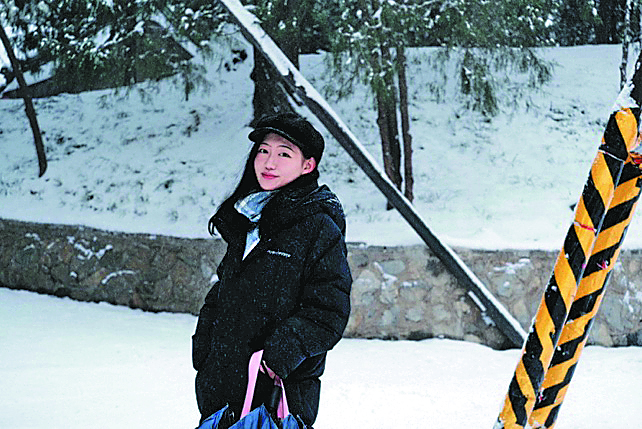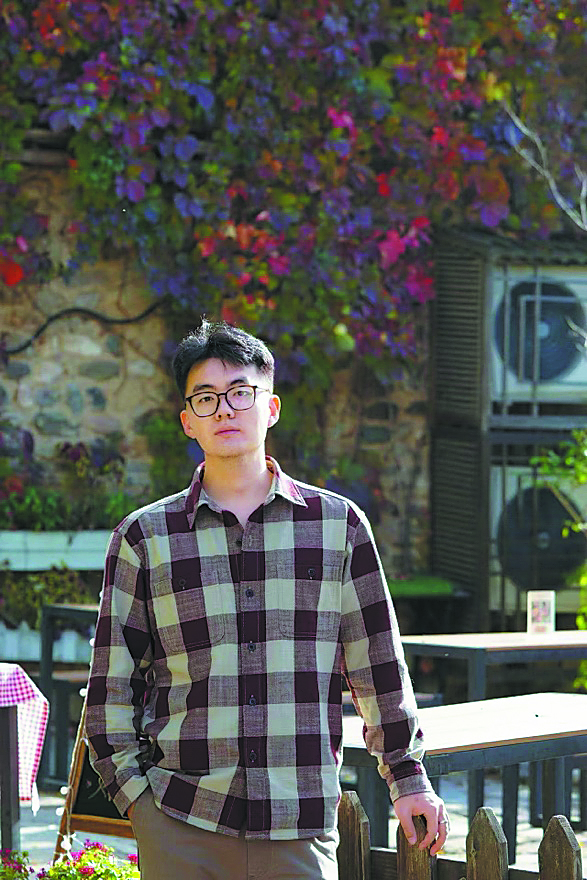
[Photo by Liang Luwen/For China Daily]
Thousands of years ago, along China's southern coastline, fishing communities would pray to Mazu, the folk goddess of the sea, for good luck when taking their boats to the waves.
Fast forward, and today, China's young people are also expressing their desire for luck and good fortune among the myriad pressures and stresses of contemporary life, but with a modern twist.
Last year, young people posted over 5.76 million scrolling comments with the word "jie", which means to accept or catch, on Bilibili, a Chinese video-sharing platform. Their wishes are to "catch" everything from top exam scores, job offers, promotions and good health, to salary raises and romantic relationships.
Offline, swarms of youngsters are going to temples to make their wishes, and temple-made bracelets are so in demand that some are willing to queue for hours just to snag one.
In 2023, Beijing's Lama Temple placed a daily cap on visits at 60,000 people, saying that over 50 percent of visitors were born in the 1990s and 2000s.
In a world of growing uncertainties, young folks are turning to something equally uncertain for solace and spiritual comfort — luck.

Echo Wang
Cyber wishing well
"Our generation is faced with tons of pressure from work, study and other things in life, and we need an outlet that is a bit away from reality yet also quite accessible to most of us, and making wishes online seems to be an ideal method for our spiritual well-being," said Echo Wang, an English teacher at a middle school in Ningbo, Zhejiang province.
Being a teacher in charge of a class of 46 students means increased responsibility, extended working hours and unexpected evening calls. Wang, 25, recalled a call from a protective parent at past 10 pm one evening who was desperately anxious about the new seating arrangement in class.
"Bob is a problem student," the mother said. "Please don't let him sit next to my son."
It turned out that Bob, (not the child's real name), had behavioral issues and would hurt others on some occasions, and had poked her son's arm with scissors in the past.
The mother's tone was understandably distressed as she recounted numerous conflicts involving Bob, warning that his large stature of 1.7 meters could pose a threat to everyone in the class.
After trying to educate Bob to behave at school to no avail, Wang's only recourse was to assign a seat for Bob at the back of the class.
Yet there are also many heartwarming interactions between Wang and her students that make her feel that it's all worth it. She recalled a boy in her class who had poor English handwriting but who would make timely corrections every time he received the teacher's feedback.
Once, after he handed in a messy dictation sheet, Wang left a comment saying, "Your handwriting is too sloppy that recognizing it makes my eyes hurt."
After the next dictation, Wang found a small bottle of eye drops stuck to his dictation book. "It's for you, Ms Wang," the message said.
Wang's getaway from the piling workload is to make wishes in the livestream room of her idol, a League of Legends esports player.
She enjoys his gameplay due to his resilience in the face of challenges and his ability to lead his team with exceptional skills.
The player livestreams on Bilibili and reads some of the scrolling danmu (bullet comments) such as "Can you wish for my work to go smoothly, early holidays and more bonuses?".
With time, the fans turned the screen into a wishing well, leaving their wishes and dreams, hoping their idol could see them and read them out loud.
"This has virtually become a cultural norm within the fan circle, and we jokingly call him 'wish boy' because he reads almost all the wishes made by fans," Wang said.
"Whether the wish comes true or not is not really important." For Wang, making a wish in her idol's livestream room is a temporary escape from reality, a reminder not to be shackled by the mundane but to embrace the numerous possibilities life offers.

Li Yuting
Soul-searching adventure
For Li Yuting, at first, she didn't quite understand why people were eager to "catch good luck".
"Now that I'm unemployed, I've started to resonate with those who post their job-hunting experiences online, and if there are already people wishing for good fortune in the comments, I'll definitely jump on the bandwagon," Li said.
Three months ago, Li decided to leave her job at a large internet company in Shanghai.
"The first few days were chaotic," she recollected. "I experienced a profound sense of emptiness and purposelessness, without a clear direction or goals in my life."
Overwhelmed by the feeling of demotivation and powerlessness, Li thought about going on a soul-searching solo trip to the Xizang autonomous region.
She had her itinerary all set and budget planned out, but when she checked her bank balance she got a firm reality check, forcing her to abandon her travel dreams.
One day, wandering aimlessly on Shanghai's streets, Li stumbled upon a temple.
"I am low on energy. The long time waiting for any results to come out in the job-hunting process could make me anxious and fretful, and the temple's chimes and chants just have the magic power to relieve all the pressure and anxiety," Li said.
After coming out of the temple, she felt like she had regained some energy. And so she came up with another travel plan, this time more grounded: returning to her hometown of Hefei in Anhui province, and reuniting with old friends to see where their good luck is coming from.
The adventure unfolded swiftly. First stop — a lively three-room apartment shared by a university pal turned PhD holder, and her partner. The place buzzed with visitors, home-cooked meals and post-dinner strolls, akin to a heartwarming sitcom.
Next, she bunked with a friend fresh from a breakup, finding solace in music, flower arrangements and DIY projects. "She lives alone but is never lonely," Li noted.
Her final stop led her to an ancient town, where a friend's family ran a grocery store doubling as a social hub. Life in this quaint town was a blend of simplicity and joy.
Returning from the trip, Li realized that luck might stem from balancing work and life. "Life's essence isn't always found in far-flung adventures but in the daily hustle and intrinsic energies," the 27-year-old said.
Li shared her experiences living in the three different apartments online to inspire others in similar situations. The post quickly became popular, garnering over 10,000 likes within hours.
In the closing moments of the video, Li wrote: "If, like me, you are facing inevitable changes, I hope you will take the time to find a suitable way of living. Change isn't a curse but a chance for growth. Here's to good luck."

Zhang Hanqing
Sporting chance
In the eyes of Zhang Hanqing, a former college basketball player, luck is as vital on the court as off it.
Years ago, when Zhang played for his university basketball team, he and his team would follow some "superstitious rules" before each game despite firmly believing that actions and efforts determine final outcomes.
Zhang reminisced about their coach's pregame tradition of giving each player a fried dough stick. Based on past experiences, the coach believed that with such dough in their stomachs, the players would perform at their best and secure victory.
A few months ago, Zhang developed an interest in Chinese fortune-telling after reading the I Ching, an ancient Chinese divination manual dating back 3,000 years.
"I've always had a longing and respect for classical Chinese culture. Last year, when I encountered some challenges in my career, I turned to Chinese fortunetelling to solve my confusion," the 26-year-old, who works at a state-owned company, said.
There are various methods of fortunetelling, and Zhang is exploring liuyao (literally meaning six convergences), a method that involves predicting outcomes by rolling three copper coins six times while factoring in celestial stems and terrestrial branches.
"Now, there are even mobile phone apps that can simulate the coin rolling and interpretation processes," he said.
Zhang finds divination to be a helpful tool in decision-making during dilemmas. Recently, he received invitations to two basketball matches at the same time: one from his hometown team in Taiyuan, Shanxi province, and the other from his company in Nanchang, Jiangxi province.
Feeling torn between the two, he turned to traditional fortune-telling for guidance. The results hinted at sincerity as the key. He followed the advice and felt relieved after telling his hometown team that he would try to return in time but would prioritize attending the company's match first.
Zhang also offers free fortune consultancies to his friends. Most of the individuals seeking his guidance are girls, who ask questions like, "Would it be better for me to find a job and settle in another city rather than my hometown?" and "Will my relationship with my crush work out?".
"It's a way to assist my friends emotionally and provide advice from different perspectives," he said.
But the amateur fortune-teller learned a harsh lesson when a prediction went awry. One time, a friend asked him to predict if she would get back together with her ex-boyfriend. Zhang gave an affirmative answer.
Later, he found out that the couple broke up again because the boyfriend had cheated. Zhang felt bad for giving the wrong advice and potentially influencing their decision. This made him realize the importance of giving guidance without impacting others' actions.
Learning fortune-telling has helped Zhang adopt a more objective and dialectical approach to situations. "Acquiring the basics of Chinese fortune-telling has taught me to assess situations from different perspectives, be cautious and deliberate before making decisions, as every choice has consequences," he said.
"Remember, fortune-telling is just a guide; the real magic lies in taking charge of your destiny."

Shi Zheng
Viewing superstition
Shi Zheng is a PhD student in Marxism at Tsinghua University. A self-professed philosophical materialist, Shi admits that he can get "superstitious" sometimes, especially before exam results come out.
The viral trend of reposting pictures of koi fish online and commenting "wish I can be as lucky" reminds Shi of his behavior back in middle school.
"After each test, I'd avoid checking grades, waiting for teachers or classmates to break the news. If I checked myself, the results were always dismal — a lesson learned the hard way," Shi said.
The habit gradually faded away as he entered university. The thought-provoking talks with professors, mind-broadening lectures on culture and history and ample time to immerse himself in a sea of books have all reshaped him to be an explorer of different thoughts, histories of civilizations and the vast, unknown world.
Shi decided to continue learning and applied for a PhD degree in Marxism.
Now he understands that there's no direct relation between beliefs in supernatural things and the final results, but still thinks that superstition goes hand in hand with people's desire for better lives.
From courses such as Research on the Basic Issues of Marx's Ethics and Contemporary Social Thoughts, Shi has learned to be realistic, dialectic and appreciate the inherent complexity of issues.
Research on Marxism has also enabled Shi to treat history as a mirror to reflect the current status quo, although he bears in mind that history is an upward spiral. "I figured there's a need to combine history with reality. Many incidents happening now have happened in history, and you want to dive into that history and study the logic behind it."
Shi said the answer as to why people pursue luck must partially lie in history. The development of a word's semantic meaning is reflexive of the state of affairs in society in different periods.
He noted that the Chinese character for "wish", zhu, contains a radical meaning divine and sacrificial offering, but over the years the connotation of the character has evolved.
"Today, when we wish someone well, it's not about divine blessings but sincere hopes for their happiness," Shi said.
"It's unrelated to superstition but represents a yearning for good and expectations of a brighter future."